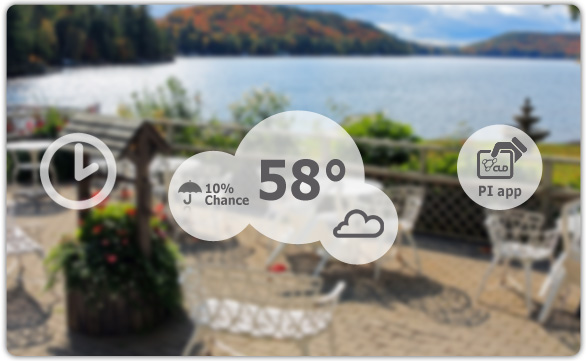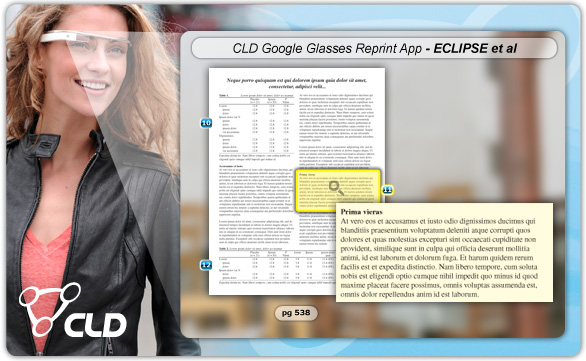Almost a year has passed since the press first confirmed Google’s Project Glass. The idea of augmented reality glasses and heads-up displays are now fact rather than fiction (Heck, the glasses are already the best invention of 2012 according to Time Tech). Before we begin to imagine some of the ways Project Glass could change the way pharmaceutical, medical device, and diagnostic sales reps are trained, I strongly suggest you watch the video below:
1. iPad & tablets soon to be obsolete?
If you just rolled out iPads or tablets to your sales reps, don’t worry just yet. The word is not yet in on whether Google Glasses will become the new norm or the next Newton. However, I am certain that five years ago most of us never thought we’d have or be as dependent on our iPads, tablets, and smartphones for training, let alone our daily lives, as we are today.
Head down and hands-on is how we primarily interact with our current devices now (just look at people walking down the street). Head up and hands-free sounds like the future.
2. Latest PI in the blink of an eye
Imagine this: your rep is speaking to a physician about product A. He/she asks your rep about the recommended dosing for patients in a specific population. Unsure of the answer, he/she accesses the latest annotated package insert (PI) via their glasses and gives the correct answer. No need to fumble around getting the iPad out of the bag or pulling the smartphone out of the pocket.
An imagining of what the glasses’ heads up display (HUD) could look like with a PI app:
Keep in mind that this new technology will cut both ways. Physicians are likely to be very early adopters. A truly hands-free solution that could give them instant access to patient data, possibly by face recognition alone, will be very tempting. The possibilities are simply endless in a healthcare setting. It is important to consider that physicians will also be able to quickly access the latest journal article or PI to instantly challenge any claims made by your reps.
3. Augmented reality preceptorships
Most virtual preceptorships are experienced via a PC or tablet. Getting a chance to walk around a hospital and shadow Dr. Smith for a day is increasingly rare. If done right, augmented reality could be a training game changer and will allow your reps to shadow Dr. Smith (a pre-recorded version of him, that is). Could an ordinary room or even your living room become a physician’s office or an operating room? Could you partner with a local hospital so that newly hired sales reps can have an augmented reality tour of the very hospital they will call on?
;4. Instant manager coaching
Working with reps in person 1-on-1 is still one of the most effective means to coaching. Unfortunately, geography and lack of time make it a challenge to do so on a regular basis. Google Glasses would easily bridge this divide. Think of it…video chats on the go between the two parties. The ability of managers and reps to push key information to each other, in order to drive the conversion of key clinical and product knowledge into successful sales, would be powerful.
Objection handling training could also evolve. Managers could connect to the sales reps’ Google Glasses video feed and get a true first-person point of view of how a rep sees, acts, and sounds in a real or staged sales environment.
5. Virtual classroom training
Would seeing a presentation or demonstration from an instructor’s-eye view add an interesting new dimension for learners? For example, a medical device company needs to train its reps on a new device. The instructor puts on the glasses as he/she works through correct operation of the device. It seems far more natural to see through the instructor’s eyes and watch their hand movements versus hovering over their shoulder, or even worse, standing opposite them.
6. Interactive workshops
If the glasses can dynamically react to the information presented or even the faces of presenters, workshops as we know them would change. Knowledge checks could be completed in the blink of an eye and instant leaderboard updates could drive friendly peer competition during games.
Summary
Will any of this come to pass? As I mentioned in my opening, the technology is already here. Beyond Google, Apple and Microsoft have their own glasses projects, too. Tomes could be written on the unlimited ways these projects could enhance our daily lives. For this blog, we are back to the question of whether or not any of the 6 ways mentioned above could actually change sales training. The honest answer is maybe or maybe not…but we better start thinking about it.
There is a saying, “Good judgment comes from experience while experience comes from bad judgment.” If that is true, then training must be the way to help others avoid our bad experiences in the first place. Google’s glasses may just be the first device that will let us do both (experiencing and training) at the same time.
Your turn!
Do you think Project Glass will impact sales training? In what ways do you see the glasses being used? Please comment below!



.png)



